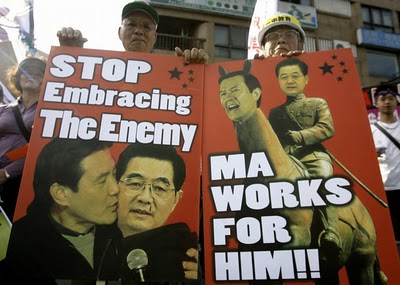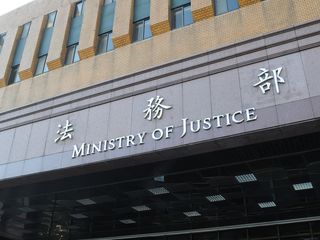February 8, 2011
Taiwan's legislator Tsai Chi-chang tells the media that Taiwan's president Ma is surrendering Taiwan to China by requiring the Taiwanese government to address China as "the Mainland" instead of "China". Ma's pro-China move is considered unusual and controversial by political commentators as it comes on the heels of the Filipino government's repatriation of 14 Taiwanese fraud suspects to China despite Taiwan's effort to stop the repatriation.

Ma Loves Him and Works for Him
To protest the Philippine government's deportation of the Taiwanese suspects to China, Taiwan has decided to recall its envoy in Manila, tighten screening of Filipino workers, and cancel visa waiver privileges for some visitors from the Philippines. Taiwan's Ministry of Justice accuses the Philippine government of infringing upon Taiwan's personal jurisdication over the 14 Taiwanese suspects.

Taiwan's Ministry of Justice
Taiwan・s president Ma Ying-jeou sent a cowardly signal to China yesterday by instructing the Taiwanese government・s officials to follow his presidential order that Taiwan should not address the People・s Republic of China, Taiwan・s arch foe and would-be invader, as "China," but should address the totalitarian Chinese regime as :the mainland; or "the other side."
Ma was quoted as saying scandalously that under the "1992 consensus", an excuse fabricated by China in attempt to rationalize its conspiracy to engulf Taiwan, there is only one China, with each side having its own interpretation, and thus, with "one China" being accepted by both sides, the mainland vs. Taiwan match-up has been the status quo of the cross-Straits relationship since the end of the civil war in 1949. Ma・s controversial command is immediately criticized by the Taiwanese people as treachery.
Despite differing peoples, China insists that China and Taiwan have a shared history and cultural background which will be a crucial stepping stone for eventual :reunification.;
By contrast, the opposite is true for Taiwan・s electorate. General elections held in Taiwan in the past 15 years show that pro-independence voters account for the majority of Taiwan・s electorate. The "de-sinolization" movement was thus the theme of the eight-year reign (2000-2008) of the pro-independence Democratic Progressive Party (DPP).
Not only was the People・s Republic of China referred to as China, to tell the world that Taiwan is not part of China, Taiwanese companies bearing the word China were asked to rename. The long-forgotten history of Taiwan was also introduced into the history textbooks used in Taiwan.
As a result, in Taiwan, a Taiwanese identity has mushroomed over the last decade. The development of statehood has boosted Taiwan・s self-esteem. The eight years when the DPP was in power also saw Taiwan gradually enhances its economic competitiveness and cultural vitality. The once frustrated nation was rejuvenated by political self-determination.
At present, the ongoing KMT-driven suspension of the "de-sinolization" campaign is a hindrance to Taiwan・s political renaissance, economic development, and cultural revival.
On the island state, Ma's latest remarks, which were interpreted as seeking future campaign benefits and legitimizing Kuomintang (KMT) rule, will no doubt distance Ma from Taiwan・s ever-aspiring electorate.